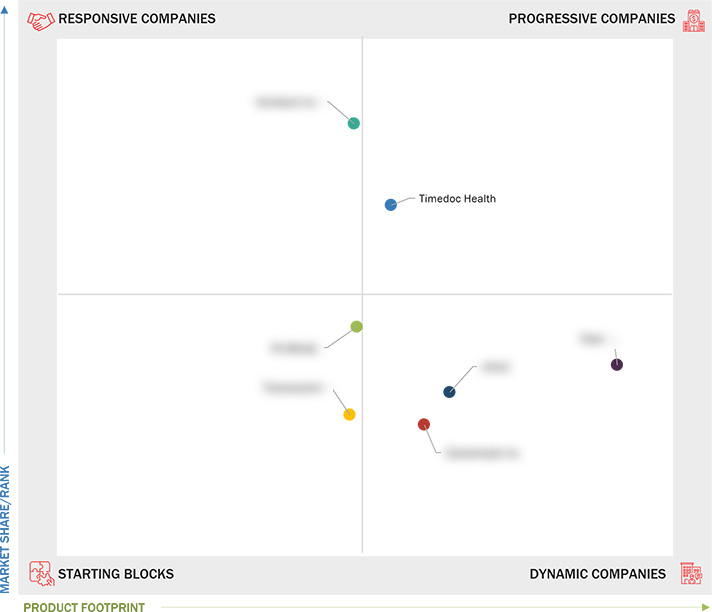Comparing 7 vendors in Telehealth and Telemedicine Startups across 0 criteria.
✅ What You Get with This Report
- 📊
Comprehensive Company Analysis - Business strategy, SWOT, financials, growth areas, M&A moves
- 🏆
Market Position & Share Insights - Visual competitive landscape (like the quadrant above)
- 🔍
Segment-level Benchmarking - Product, region, and end-user vertical
- 📁
Image & Report PDF Downloads - Ready-to-use for presentations and strategy sessions
- 📈
Demand Generation [Optional Buy] - License quadrant to drive demand & showcase leadership
✅ Analyst-led
✅ One-time payment
👉 Get Instant Access
1 INTRODUCTION
1.1 Study Objectives
1.2 Market Definition
1.2.1 Telehealth
1.2.2 Telemedicine
1.3 Study Scope
1.3.1 Market Segmentation & Geographical Spread
1.3.2 Inclusions & Exclusions
1.3.3 Years Considered
1.3.4 Currency Considered
1.4 Stakeholders
1.5 Summary of Changes
2 MARKET OVERVIEW
2.1 Introduction
2.2 Market Dynamics
2.2.1 Drivers
2.2.1.1 Growing geriatric population and increasing need for
advanced healthcare infrastructure
2.2.1.2 Rising prevalence of chronic diseases
2.2.1.3 Reduced time and lower out-of-pocket costs
2.2.1.4 Advancements in telecommunication technologies
2.2.1.5 Shortage of skilled healthcare professionals
2.2.1.6 Increased government support and favorable regulatory
policies
2.2.1.7 Expansion of remote patient monitoring systems
2.2.2 Restraints
2.2.2.1 High investment costs for B2B models and lack of IT
expertise
2.2.2.2 State-to-state and inter-country regulatory variations
2.2.2.3 Behavioral reluctance to adopt new technologies
2.2.2.4 Rise in fraud and abUse in healthcare systems
2.2.2.5 Adherence to patient privacy, confidentiality, medical
ethics
2.2.3 Opportunities
2.2.3.1 Growing Use of wearables, applications, and sensors for
virtual care
2.2.3.2 Emergence of AI and ML
2.2.3.3 Increasing shift toward outpatient care models
2.2.3.4 High utility of telemedicine against infectious
communicable diseases and epidemics
2.2.3.5 Expansion of hospital-at-home (HaH) initiatives
2.2.3.6 Demand for electronic medical record-based telehealth
services
2.2.3.7 Rising incidence of mental illnesses and growing focus on
emotional well-being
2.2.4 Challenges
2.2.4.1 Data security and confidentiality concerns
2.2.4.2 Limited data accessibility
2.2.4.3 Inability to maintain patient hygiene and cleanliness
standards
2.3 Trends/Disruptions Impacting Customer’s Business
2.4 Industry Trends
2.5 Ecosystem Analysis
2.6 Value Chain Analysis
2.7 Technology Analysis
2.7.1 Key Technologies
2.7.1.1 Video conferencing and real-time communication platforms
2.7.1.2 AI and ML
2.7.1.3 Virtual assistants and chatbots
2.7.1.4 Voice recognition and natural language processing
2.7.1.5 EHR integration
2.7.1.6 Remote patient monitoring systems
2.7.2 Complementary Technologies
2.7.2.1 Edge computing
2.7.2.2 Cloud computing
2.7.2.3 Mobile health (mHealth) applications
2.7.2.4 Wearable devices, sensors, and IoT
2.7.3 Adjacent Technologies
2.7.3.1 Digital therapeutics
2.7.3.2 Blockchain technology
2.7.3.3 Augmented reality and virtual reality
2.8 Trade Analysis
2.8.1 Trade Data for HSN Code 90189099
2.8.1.1 Top 10 importers for HSN code 90189099
2.8.1.2 Top 10 exporters for HSN code 90189099
2.8.2 Trade Data for HSN Code 9021
2.8.2.1 Top 10 importers for HSN code 9021
2.8.2.2 Top 10 exporters for HSN code 9021
2.8.3 Trade Data for HSN Code 9022
2.8.3.1 Top 10 importers for HSN code 9022
2.8.3.2 Top 10 exporters for HSN code 9022
2.9 Porter’s Five Forces Analysis
2.9.1 Threat of New Entrants
2.9.2 Threat of Substitutes
2.9.3 Bargaining Power of Buyers
2.9.4 Bargaining Power of Suppliers
2.9.5 Intensity of Competitive Rivalry
2.10 Patent Analysis
2.10.1 Patent Publication Trends for Telehealth & Telemedicine
2.10.2 Insights: Jurisdiction and Top Applicant Analysis
2.11 Unmet Needs & End-User Expectations
2.11.1 Unmet Needs
2.11.2 End-User Expectations
2.12 Key Conferences & Events, 2025–2026
2.13 Investment & Funding Scenario
2.14 Business Model Analysis
2.14.1 Direct-to-Patient (D2P) Model
2.14.2 Business-to-Business (B2B) Model
2.14.3 Employer-Sponsored Model
2.14.4 Subscription-Based Model
2.14.5 Hybrid Telemedicine Model
2.14.6 Platform-as-a-Service (PaaS) Model
2.14.7 Value-Based Care Model
2.15 Impact of AI/Gen AI in Telehealth & Telemedicine Market
2.15.1 Key Use Cases
2.15.2 Major Case Studies
2.15.2.1 AI to redefine treatment effectiveness and safety
2.15.2.2 AI-driven chatbots and telehealth to enhance mental health
and chronic disease management
2.15.3 Impact of AI/Gen AI on Interconnected and Adjacent Ecosystems
2.15.3.1 Healthcare IT and EHR systems
2.15.3.2 Pharmaceuticals & drug discovery
2.15.3.3 Mental health tech
2.15.3.4 Healthcare analytics and insights
2.15.4 User Readiness & Impact Assessment
2.15.4.1 User readiness
2.15.4.1.1 User A: Hospitals
2.15.4.1.2 User B: Ambulatory surgery centers
2.15.4.2 Impact assessment
2.15.4.2.1 User A: Hospitals
2.15.4.2.2 User B: Ambulatory surgery centers
2.16 Reimbursement Scenario Analysis
3 COMPETITIVE LANDSCAPE
3.1 Introduction
3.2 Key Player Strategies/Right to Win
3.2.1 Overview of Strategies Adopted By Key Players in Telehealth &
Telemedicine Market
3.3 Revenue Analysis, 2019–2023
3.4 Market Share Analysis, 2023
3.5 Company Evaluation Matrix: Startups/SMEs, 2023
3.5.1 Progressive Companies
3.5.2 Responsive Companies
3.5.3 Dynamic Companies
3.5.4 Starting Blocks
3.5.5 Competitive Benchmarking: Startups/SMEs, 2023
3.5.5.1 Detailed list of key startups/SMEs
3.5.5.2 Competitive benchmarking of key startups/SMEs
3.6 Company Valuation & Financial Metrics
3.7 Brand/Software Comparative Analysis
3.8 Competitive Scenario
3.8.1 Product Launches & Approvals
3.8.2 Deals
3.8.3 Expansions
3.8.4 Other Developments
4 COMPANY PROFILES
4.1 TIMEDOC, INC.
4.1.1 Business overview
4.1.2 Products/Solutions/Services offered
4.1.3 Recent developments
4.2 CEREBRAL INC.
4.2.1 Business overview
4.2.2 Products/Solutions/Services offered
4.2.3 Recent developments
4.3 KINDBODY
4.3.1 Business overview
4.3.2 Products/Solutions/Services offered
4.3.3 Recent developments
4.4 TRANSCARENT
4.4.1 Business overview
4.4.2 Products/Solutions/Services offered
4.4.3 Recent developments
4.5 CARESIMPLE INC.
4.5.1 Business overview
4.5.2 Products/Solutions/Services offered
4.5.3 Recent developments
4.6 VSEE
4.6.1 Business overview
4.6.2 Products/Solutions/Services offered
4.6.3 Recent developments
4.7 EVISIT
4.7.1 Business overview
4.7.2 Products/Solutions/Services offered
4.7.3 Recent developments
Latest
Kindbody Releases 2024 State of Women and Fertility Healthcare Report
 Oct 2024
Oct 2024 Kindbody
KindbodyVSee Health Highlights: AI-Powered Telehealth Redefining the $787 Billion Digital Healthcare Market
 Apr 2025
Apr 2025 VSee Health, Inc.
VSee Health, Inc.Company List



